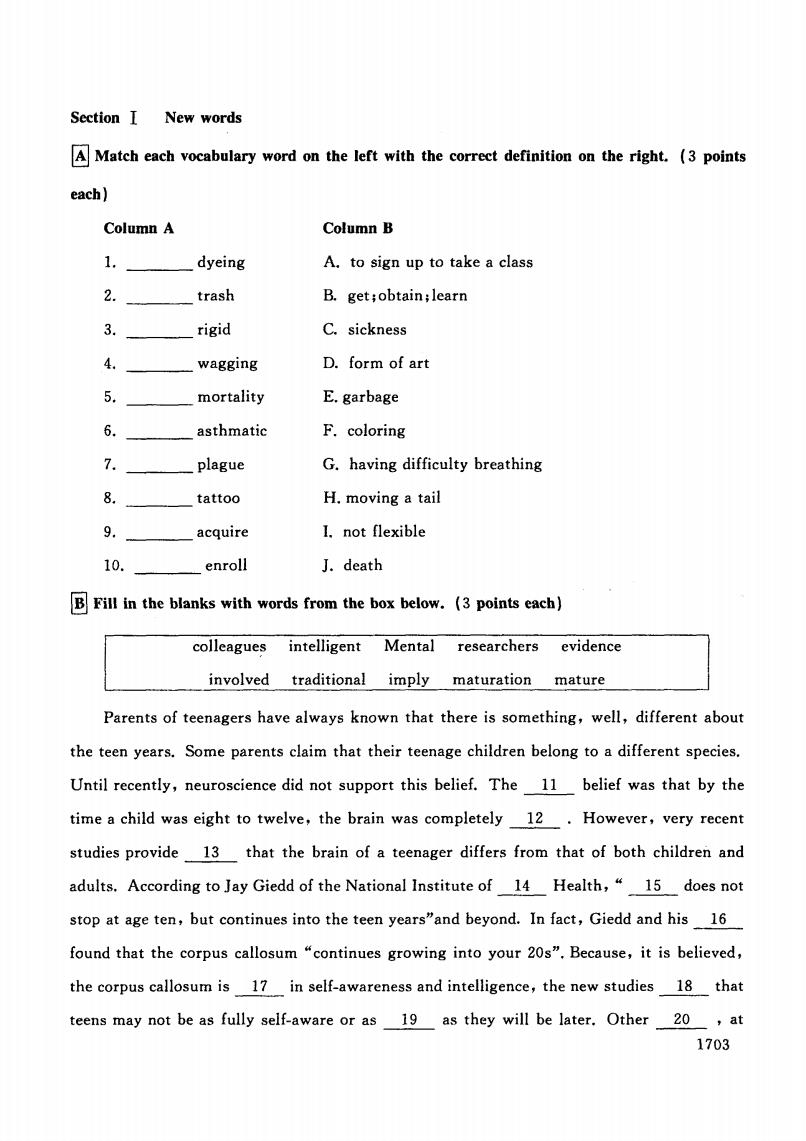正在加载图片...

Section I New words A Match each vocabulary word on the left with the correct definition on the right.(3 points each】 Column A Column B 1. dyeing A.to sign up to take a class 2. trash B.get;obtain;learn 3. rigid C.sickness 4. wagging D.form of art 5. mortality E.garbage 6. asthmatic F.coloring 7. plague G.having difficulty breathing 8. tattoo H.moving a tail 9. acquire I.not flexible 10. enroll J.death BFill in the blanks with words from the box below.(3 points each) colleagues intelligent Mental researchers evidence involved traditional imply maturation mature Parents of teenagers have always known that there is something,well,different about the teen years.Some parents claim that their teenage children belong to a different species. Until recently,neuroscience did not support this belief.The 11 belief was that by the time a child was eight to twelve,the brain was completely 12.However,very recent studies provide 13 that the brain of a teenager differs from that of both children and adults.According to Jay Giedd of the National Institute of 14 Health,"15 does not stop at age ten,but continues into the teen years"and beyond.In fact,Giedd and his 16 found that the corpus callosum "continues growing into your 20s".Because,it is believed, the corpus callosum is 17 in self-awareness and intelligence,the new studies 18 that teens may not be as fully self-aware or as 19 as they will be later.Other 20,at 1703Section I New words each vocabulary word on the left with the ωrrect definition on the 胁t. (3 points each) Colun撞A Column B 1. dyeing A. to sign up to take a class 2. trash B. get;obtain ;learn 3. rigid C. sickness 4. waggmg D. form of art 5. mortality E. garbage 6. asthmatic F. coloring 7. plague G. having difficulty breathing 8. tattoo H. moving a tail 9. acqUIre I. not flexible 10. enroll J. death ill in 伽blanks with words from colleagues intelligent Mental researchers evidence involved traditional imply maturation mature Parents of teenagers have always known that there is something. well. different about the teen years. Some parents claim that their teenage children belong to a different species. Until recently. neuroscience did not support this belief. The 11 belief was that by the time a child was eight to twelve. the brain was completely 12 . However. very recent studies provide 13 that the brain of a teenager differs from that of both children and adults. According to Jay Giedd of the National Institute of 14 Health." 15 does not stop at age ten. but continues into the teen years"and beyond. In fact. Giedd and his found that the corpus callosum "continues growing into your 20s". Because. it is believed. the corpus callosum is 17 in self-awareness and intelligence. the new studies 18 that teens may not be as fully self-aware or as _1 as they will be later. Other ~一. at 1703